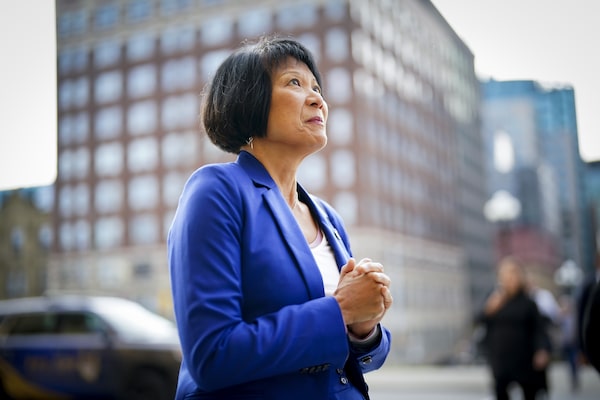
Toronto Mayor Olivia Chow arrives to West Block of Parliament Hill in Ottawa on Sept. 27. Toronto city council voted 24-1 on Wednesday in favour of Ms. Chow’s housing plan.Sean Kilpatrick/The Canadian Press
Toronto Mayor Olivia Chow secured strong city council support on Wednesday for her affordable housing plan, though critics raised questions about how Toronto would pay for its portion of the multibillion-dollar effort.
The plan lays out a path for the city to build tens of thousands of units of low-cost housing. For the first time in decades, city staff, and not the private sector, would lead the development process for such projects.
“People need hope in finding a home,” said Ms. Chow, a former city councillor and Toronto MP who was elected mayor in June.
“At council here over the years, we talked and talked about building housing … we’ve built condominiums, but are they affordable? No. Not to ordinary people,” she said.
Council voted 24-1 on Wednesday in favour of Ms. Chow’s plan, which calls for Toronto to build 65,000 affordable rental units by 2030. Doing so will require tens of billions of dollars.
Ottawa and the Ontario government would need to provide low-cost loans, as well as between $500-million and $800-million each, in each of those seven years. Neither level of government has made such a commitment.
Under the plan, Toronto would put up the same amount of money as each of the higher levels of government.
The council debate took place against a backdrop of intense concern over housing affordability. Real estate and rent costs have spiralled upward in Toronto, stretching resources for many residents and pushing young and low-income people out of the city.
Ontario may have to operate two Toronto LRTs amid city budget crunch, documents show
The federal government has responded to housing affordability concerns across the country by offering funding to cities willing to make it easier to build. But this week the country’s premiers issued a joint statement in which they raised objections to the move, arguing the money needs to flow through their hands.
Ms. Chow said at council that she had spoken Tuesday evening to federal Housing Minister Sean Fraser. “Hopefully there will be funds coming,” she said. “Sounds very positive.”
Senior Toronto municipal staff are also in the midst of a series of meetings with provincial and federal officials, in pursuit of a new financial deal for the city. Toronto is facing a $1.5-billion shortfall as it prepares its 2024 operating budget.
The financial demands of Ms. Chow’s housing proposal caught the attention of fiscal conservative and Etobicoke councillor Stephen Holyday, the only person who voted against the plan.
At the council meeting, he demanded to know what the cash-strapped city would cut to free up enough money to pay for its part. Ms. Chow did not answer directly. Instead, she pointed to continuing public budget consultations, which allow residents to have input on the city’s priorities.
Mr. Holyday remained unconvinced. “I can’t support a process going forward that is kind of on a wing and a prayer with where the money is going to come from,” he told council.
Councillor Brad Bradford, an opponent of Ms. Chow in this year’s mayoral race, was strongly critical of the city taking the lead in building housing. But others on council argued the status quo for building affordable housing simply wasn’t working.
“Thirty years of the same mistake I really think is enough,” councillor Dianne Saxe said. “There are only two choices: Either we have no affordable housing or governments build it.”
 Oliver Moore
Oliver Moore